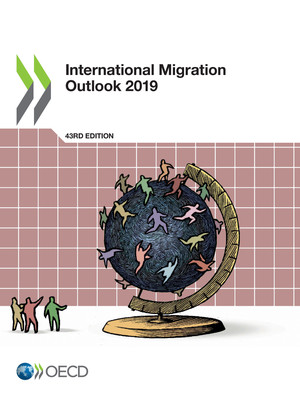copy the linklink copied!Russian Federation
11.2 million, 51% women
8% of the population
Main countries of birth:
Ukraine (26%), Kazakhstan (22%), Uzbekistan (10%)
According to Rosstat, net immigration decreased again sharply in 2018 to 125 000 and, for the first time since 2009, could not compensate for the negative natural growth. In 2016 and 2017, net immigration amounted for 262 000 and 212 000, respectively. Most immigrants come from the former USSR and in 2018, the largest sources of net immigration were Tajikistan (31 000) and Kazakhstan (27 000).
In 2018, the migration authorities issued 271 000 temporary residence permits (11% decrease since 2017) and almost 190 000 permanent residence permits (4% increase). In total, the new issuances of residence permits declined from 486 000 in 2017 to 461 000 in 2018. Ukraine, Tajikistan and Kazakhstan remained the top three nationalities with 142 000, 64 700 and 61 400 permits issued, respectively.
Beginning of 2019, the stock of foreigners with valid temporary and permanent residence permits reached 1.143 million (almost no change compared to the previous year), of whom 30% were Ukrainian citizens.
In 2018, migration authorities issued over 1.8 million permissions to work, only 1.6% less than in 2017. Among them, around 1.7 million were issued to nationals of visa-free states of the former USSR. The remaining authorisations were regular work permits (82 000, a 21% decrease compared to 2017), permits for skilled professionals (20 000 or 12% increase) and highly skilled specialists (28 000, an 8% increase). Over half of all issued authorisations (993 000) were granted to citizens of Uzbekistan, a 2% increase compared with the previous year. Citizens of Tajikistan followed with almost 471 000 patents (almost same as in 2017), and 112 000 authorisations were issued to citizens of Ukraine, a 17% decrease compared to 2017. Migrants from these three countries accounted for 87% of all issued permissions.
On 31 October 2018, the Decree No. 622 of the President of the Russian Federation adopted a new Concept of the National Migration Policy for the period 2019-2025, replacing the previous Concept adopted in 2012. It includes an emphasis on the protection of Russian culture and language but also expresses the need to attract different categories of migrants through the establishment of new immigration channels and conditions beyond those for migrants with ethnic or cultural ties to Russia. The development of an action plan for the implementation of this Concept is currently underway. A working group including representatives of the Presidential Executive Office, the Federal Assembly, the Government of the Russian Federation, the Moscow Government, the Accounts Chamber, and federal executive bodies, was established in March 2019.
New registration rules for migrants in a place of temporary residence were established by Federal Law No. 163-FZ. An employer can no longer provide its official address for formal registration of foreign workers who de facto reside in another place. Registration has to be at the address of actual residence.
On 31 October 2018, a migration amnesty for Moldovan citizens with minor violations of Russian administrative legislation was agreed after negotiations between the Presidents of Russia and Moldova. Citizens of Moldova in the Russian Federation with a violation of the permitted period of stay (concerning about 180 000 individuals) could leave Russian territory between 1 January and 24 February 2019 without facing administrative responsibility or a possible entry ban for violation of the terms of stay.
In the summer of 2018, Russia hosted the FIFA World Cup. More than 700 000 foreign football fans arrived in Russia via a simplified procedure substituting a “fan card” for an entry visa. On 3 August 2018, the President of Russia signed a Federal Law extending the right of visa-free entry to Russia until 31 December 2018, for foreign citizens and stateless persons who attended the 2018 World Cup as spectators.
In 2018, Russia signed bilateral agreements on visa-free visits with Jamaica (ratified in November 2018) and United Arab Emirates (5 July 2018, draft agreement). The citizens of partner states can visit each other’s country without a visa and stay there for a maximum of 90 days.
In 2018, Russia started to expel North Korean migrant workers to abide by the terms of UN sanctions against the Democratic People's Republic of Korea.
A new law adopted on 18 December 2018 simplified the procedure for granting Russian citizenship to selected categories of foreigners. It also extended the President’s power to grant citizenship to foreigners living in countries with complicated socio-political and economic situations, for example, where there are armed conflicts or a change of political regime.
In March 2019, the responsibilities of the Office of the President of the Russian Federation were enlarged to include support of the activities of the President on state migration policy. This includes data analysis and formulation of policy advice.
For further information:
https://мвд.рф/mvd/structure1/Glavnie_upravlenija/guvm
https://мвд.рф/Deljatelnost/statistics/migracionnaya
Metadata, Legal and Rights
https://doi.org/10.1787/c3e35eec-en
© OECD 2019
The use of this work, whether digital or print, is governed by the Terms and Conditions to be found at http://www.oecd.org/termsandconditions.



